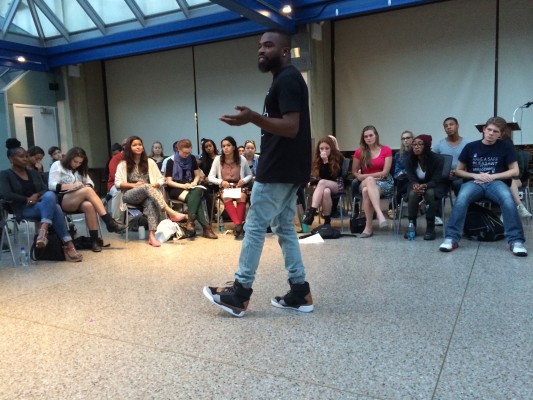Darnell L. Moore Leads Conversation About Policing in America
September 27, 2014

Members of the Fordham community met in the Atrium in the Ram Cafe at Fordham College at Lincoln Center (FCLC) on Friday, Sept. 26, to share their reactions to the recent police shootings across the country and to learn about how to speak out against institutionally racist policing.
The event was sponsored by the Black Student Alliance, the Dorothy Day Center for Service and Justice, and the African and African-American Studies Department. It featured guest speaker Darnell L. Moore, Bedford -Stuyvesant, Brooklyn-based writer and activist who has been integrally involved in “Black Lives Matter,” a movement that has organized nationwide bus rides to Ferguson, Mo., where unarmed black teenager Michael Brown was shot and killed by white police officer Darren Wilson.
After leading a 30-second meditation to honor the victims of police brutality, Moore explained why he has been a part of a movement that is based on “an assumption that we all should know is true;” the assumption that black lives matter. “We exist in a culture with a history that is full of a genealogy that points to various examples where black lives, brown lives, and the lives of so many others absolutely didn’t matter.”
Moore told the stories of a 10-year-old girl from Los Angeles who traveled 36 hours and a 17-year-old girl from New York who traveled 21 hours to join the Ferguson community. “They feel the traumatic trace of something very heavy, something very very toxic. A 10-year-old girl who should be playing in the park should not be concerned about whether or not her life is going to be snatched away,” Moore said.
“What makes you so hungry for justice?” Moore asked after telling the story of the Lost Voices, a group of young people, who were arrested Friday, who have been protesting the killing of Michael Brown by sleeping outside in tents near where he was killed since Aug. 9. “Folks have lost their jobs because they have been protesting everyday.”
Noting that Black Lives Matter was started by two queer women, Moore emphasized how important expanding the racial justice framework is to him. “Racial justice has only ever really been organized around this notion of a black straight man…People forget all about the black girls and women…We can no longer allow queer, trans black folk to be invisibilized in the fight for justice,” Moore explained.
“All black lives matter,” he said. “I’m really tired of having to host stuff like this, to give talks like this, come and try to convince people that black lives matter. It’s 2014. I want the type of world where my nieces and my nephews would not have to come to a talk like this on a college campus,” Moore said.
For 40 minutes, the floor was opened to those who wanted to share their experiences or reactions.
Here are their voices:
“Frustrated and disgusted.”
“I feel more scared than anything.”
“It’s very frustrating because sometimes when my brother leaves, I’m like, ‘I hope I see you later,’ and that’s so sad.”
“It’s a shame that it takes lives to be lost for people to actually stand up and see what’s actually happening.”
“It didn’t shock me.”
“When I saw what the youth was doing out in Ferguson, it made me just want to organize.”
“In the wake of Ferguson, I’ll never forget when I was watching CNN, and they had a segment called ‘How Black Youth Should Engage with the Police.’ Why do I have my own set of rules about how to engage with police? I don’t see no ‘How Whites Should Engage with Police.’”
“What pisses me off the most is that I still have peers who think this is actually all right.”
“I am shocked as a white person.”
“I came here because a friend of mine was murdered a few weeks ago. A young black man.”
“There are no more excuses. There is literally not a single one.”
“You get asked eight times in the Gap, ‘Do you need help with something?’”
“If you’re constantly wondering why this happens, please go and study the history of our country. We have to realize that our country is built on black and brown blood.”
“Instigate. Shake. Yell. Scream. Inform.”
“I grew up getting called the ‘n’ word. I grew up getting called a slave.”
“It shouldn’t take death to bring us together.”
“We as white people need to get our shit together.”
“I feel less valued as a person of color at Fordham. I feel oppressed at Fordham.”
After a short session about how to get involved, the event ended with a standing ovation for Moore.









